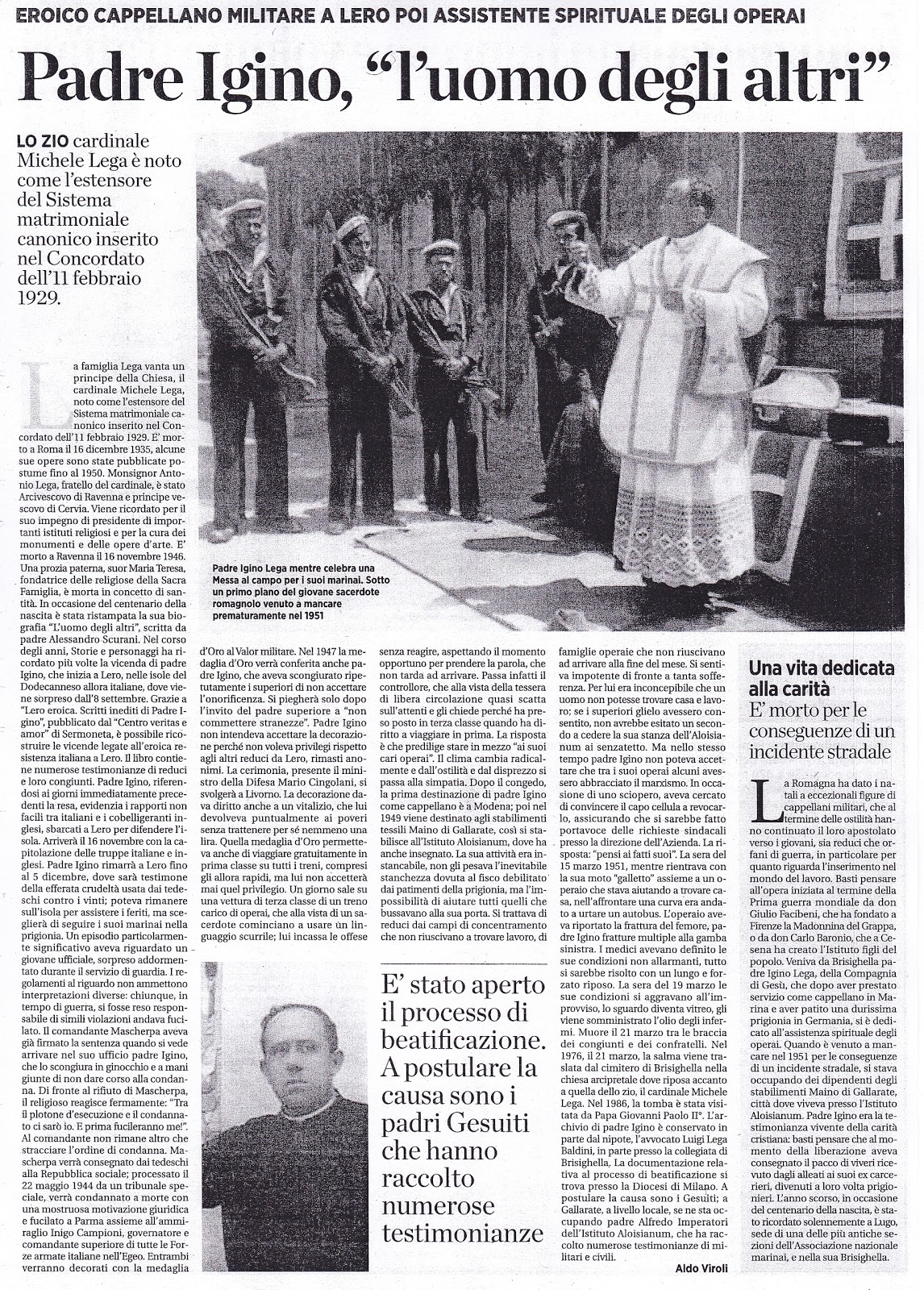Servant of God (SG) Igino Lega, SJ
Born :November 14, 1911
Died : March 21, 1951
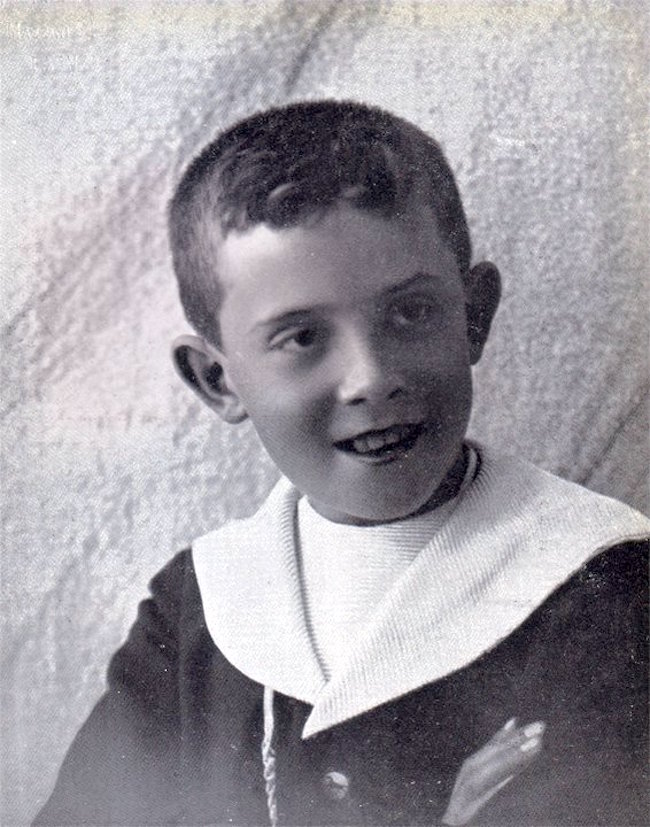 Igino Lega was born in Brisighella , near Ravenna, Italy and was the ninth of eleven children of an old and noble family. His father was a prosperous lawyer and one of his uncles was Cardinal Michele Lega, Prefect of the Sacred Congregation of the Sacraments, and another, Antonio Lega, was Archbishop of Ravenna. His mother’s father, Antonio Nardozzi was a renowned Latin scholar and translator of Virgil.
Igino Lega was born in Brisighella , near Ravenna, Italy and was the ninth of eleven children of an old and noble family. His father was a prosperous lawyer and one of his uncles was Cardinal Michele Lega, Prefect of the Sacred Congregation of the Sacraments, and another, Antonio Lega, was Archbishop of Ravenna. His mother’s father, Antonio Nardozzi was a renowned Latin scholar and translator of Virgil.
After his studies at the Jesuit school and the Society’s Collegio Casentino Arici, Igino entered the Jesuit novitiate in Gorizia in November 1928. He taught grammar at the Apostolic School after his philosophy before doing his theology in Turin in 1937. He and his class-mates were ordained to the priesthood earlier than usual in 1940 because of the uncertainty about when Italy would join the war which was already on in Europe.
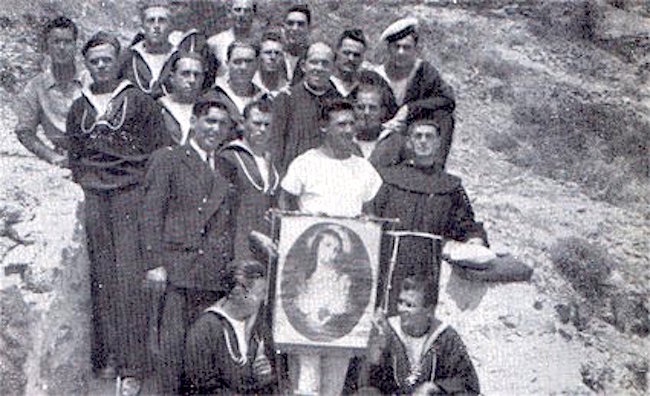 Fr Lega was sent as a naval chaplain to the Dedecanese (then under Italy) with Leros as his destination as it was Italy’s largest naval and submarine base. He was the only military chaplain there and his 5000 men were spread over the entire island. To get to know his men, Fr Lega went from installation to installation to meet them on his old bicycle and where it could not take him, he went on foot. He would be sweaty and covered with road dust as each installation was four to five miles apart and his simplicity and sincerity won him an opening with the men. He treated them well and spoke up for those who needed to be disciplined.
Fr Lega was sent as a naval chaplain to the Dedecanese (then under Italy) with Leros as his destination as it was Italy’s largest naval and submarine base. He was the only military chaplain there and his 5000 men were spread over the entire island. To get to know his men, Fr Lega went from installation to installation to meet them on his old bicycle and where it could not take him, he went on foot. He would be sweaty and covered with road dust as each installation was four to five miles apart and his simplicity and sincerity won him an opening with the men. He treated them well and spoke up for those who needed to be disciplined.
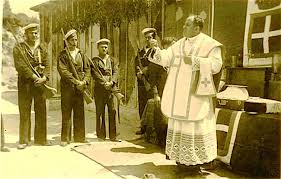 War came to the island in September 1943 after nineteen months of relative tranquility. When Mussolini had fallen and the English forces came to the island, the Germans started their steady bombardment, destroying the ships in the harbour and annihilated the men’s barracks. Within 1 month, the island suffered 140 raids. During the long siege, Fr Lega selflessly stayed with his men day and night so that he could get to the dying to ensure they could die peacefully in the Lord. He crawled from one battery to another though bombs exploded everywhere. His presence brought encouragement and his voice reassured the men. When the island fell into the hands of the Germans, the Leros defenders became prisoners of war and Fr Lega were kept with them.
War came to the island in September 1943 after nineteen months of relative tranquility. When Mussolini had fallen and the English forces came to the island, the Germans started their steady bombardment, destroying the ships in the harbour and annihilated the men’s barracks. Within 1 month, the island suffered 140 raids. During the long siege, Fr Lega selflessly stayed with his men day and night so that he could get to the dying to ensure they could die peacefully in the Lord. He crawled from one battery to another though bombs exploded everywhere. His presence brought encouragement and his voice reassured the men. When the island fell into the hands of the Germans, the Leros defenders became prisoners of war and Fr Lega were kept with them.
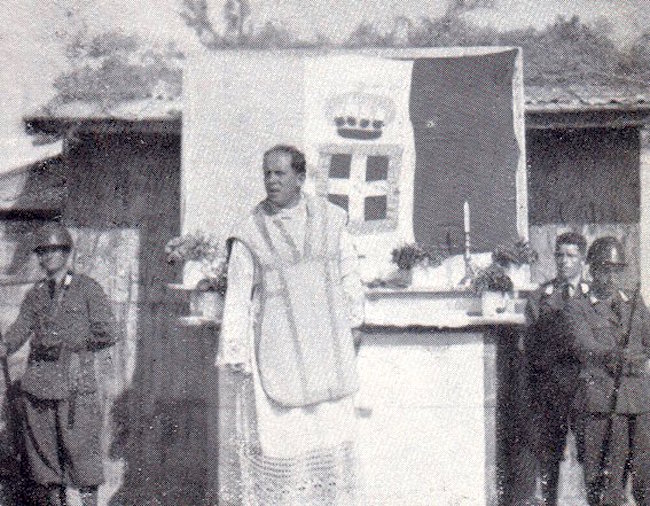 When the men were being sent to prison camps, Fr Lega asked the German commander to allow him to go to prison with his men. At the Recklinghausen work camp in Germany, Fr Lega spent his days in the mines with his fellow prisoners, but spent his evenings praying with and for them, visiting the sick, comforting the depressed and counseling those thinking of suicide. Though food was scarce, he frequently gave his rations to others, and when winter came he gave his undergarments to those suffering from the cold.
When the men were being sent to prison camps, Fr Lega asked the German commander to allow him to go to prison with his men. At the Recklinghausen work camp in Germany, Fr Lega spent his days in the mines with his fellow prisoners, but spent his evenings praying with and for them, visiting the sick, comforting the depressed and counseling those thinking of suicide. Though food was scarce, he frequently gave his rations to others, and when winter came he gave his undergarments to those suffering from the cold.
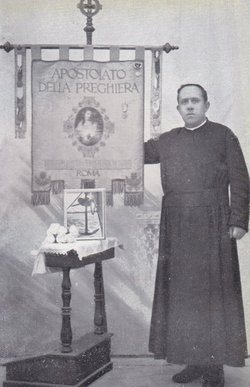 When he received word from the Jesuit provincial that the Society was trying to get him repatriated he wrote in reply on June 21, 1944: “If you want to know what I really want, it is this. Leave me here, a prisoner with my prisoners. Leave me here. The Sacred Heart helps me. You will see me. I shall return, but with my soldiers and my sailors.” The following August he was transferred to the camp at Hemer, as chaplain to some 30,000 prisoners from various nations ( Russian, Dutch, French, Greek, Italian). Many died each day. mostly from tuberculosis.
When he received word from the Jesuit provincial that the Society was trying to get him repatriated he wrote in reply on June 21, 1944: “If you want to know what I really want, it is this. Leave me here, a prisoner with my prisoners. Leave me here. The Sacred Heart helps me. You will see me. I shall return, but with my soldiers and my sailors.” The following August he was transferred to the camp at Hemer, as chaplain to some 30,000 prisoners from various nations ( Russian, Dutch, French, Greek, Italian). Many died each day. mostly from tuberculosis.
In April 1945, liberation came but Fr Lega declined to leave as long as one Italian prisoner was left in Germany; he left only in September for Padua. After a short visit home to Brisighella, he left in October for his tertianship in Trent. Upon completion in July1946, he was assigned to the retreat house in Bassano del Grappa and retreats and preaching parish missions were now his apostolate. He also visited workers in the factories during their lunch hour to try and bring them back to God and to their faith.
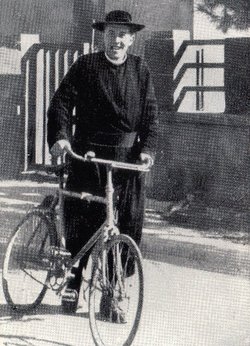 Fr Lega’s extraordinary dedication to his sailors during the fierce bombardment at Leros and his total giving of himself to Italian prisoners of war in Germany was unforgettable. When he heard he was to receive the nation’s highest honour, the medaglia d’oro for his Heroism, Fr Lega tried to turn it down and said that it should be given to the Sacred Heart, for it was Our Lord who preserved him from danger so that he can carry out his duty to his men. However, he did receive the medal at the Naval Academy on November, 1947 but as soon as the ceremony ended, he went to the chapel and pinned the medal on a banner of the Sacred Heart.
Fr Lega’s extraordinary dedication to his sailors during the fierce bombardment at Leros and his total giving of himself to Italian prisoners of war in Germany was unforgettable. When he heard he was to receive the nation’s highest honour, the medaglia d’oro for his Heroism, Fr Lega tried to turn it down and said that it should be given to the Sacred Heart, for it was Our Lord who preserved him from danger so that he can carry out his duty to his men. However, he did receive the medal at the Naval Academy on November, 1947 but as soon as the ceremony ended, he went to the chapel and pinned the medal on a banner of the Sacred Heart.
Fr Lega was later assigned to look after the spiritual welfare of factory workers in Modena who were mostly communists and because of tension between them and the church his task was a challenging one. It took time for him to break through the wall of distrust and hatred but he succeeded because of his sincerity, goodness and charity. When he was moved to Gallarate as chaplain to 3000 textile mill workers, he identified himself with the poor, helping them bear their burdens and solve their problems be it unemployment, housing or food.
On March 16, 1951, while returning from helping a worker’s family to find accommodation, his motorbike was knocked down by a motor coach coming from the opposite direction. Both he and the worker were thrown to the road. Fr Lega sustained multiple fractures to his left leg and he was told that he would be well after a few weeks of rest. When his superior visited him five days later he found Fr Lega had developed breathing problems and was eating with difficulty. Fr Lega told him: “I can no longer continue in this life. You don’t know what it is to be continually among those in need and not being able to help them. For anyone with a heart, it is enough to kill him.” The superior decided to spend the night with him. The next morning, Fr Lega was no better and the physicians could not explain why their patient took a turn for the worse so suddenly. When he grew progressively weaker they anointed him and he died ten minutes later.
Fr Lega’s body was taken to the scholasticate in Gallerate, where he had lived and given a hero’s funeral before being taken back to Brisighella. The cause for his beatification was initiated in 1973 in view of Fr Lega’s holiness of life.
